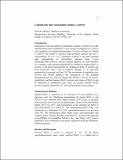Calcium ions alter monoamine oxidase A activity
Abstract
Activation of the flavoprotein monoamine oxidase A (MAO A) by calcium ions has been reported in isolated mitochondria, in cell lines, and in vivo. Enhanced MAO A activity has been associated with a rise in oxidative damage (1,2), and with apoptosis in a neuronal cell line (5). Here, purified human MAO A and membrane-bound MAO A and B were used to investigate the direct regulation of MAO activity by Ca2+ ions. At fixed substrate concentration the activity of purified MAO A was stimulated (<20%) by Ca2+ over a physiological range, a much smaller effect than observed in cells; Mg2+ and Mn2+ had no effect. However, when chelating agents (EDTA or EGTA) were added to remove divalent ions present in the water, MAO A activity was increased, but addition of 1 mM Ca2+ to the chelating buffer resulted in inhibition of activity requiring 10 min to reach the minimum. When assayed in HEPES buffer (50 mM, pH 7.4) without chelator, Ca2+ caused mixed-type inhibition of kynuramine oxidation with a Ki of 0.3 mM for binding to free enzyme. We conclude that Ca2+ (but not Mg2+ or Mn2+) interacts directly with purified MAO A to change the kinetic parameters resulting in decreased activity. In contrast, with membrane-bound MAO A (but not membrane-bound MAO B), Ca2+ enhances activity by doubling the Vmax without a change in KM. Recently, molecular dynamics simulations suggested that membrane attachment altered the conformational dynamics of MAO A and facilitated the opening of the substrate tunnel. The data here are consistent with a conformational change induced by Ca2+, the effect of which is different when the enzyme is stabilised in the membrane.
Citation
Ramsay , R R & Armstrong , S 2013 , Calcium ions alter monoamine oxidase A activity . in S Miller , R Hille & B Palfrey (eds) , Flavins and Flavoproteins 2011 : Proceedings of the 17th International Symposium IUBMB S13/2011 . Flavins and Flavoproteins , Lulu , 17th Intl Symposium on Flavins and Flavoproteins , Berkeley, CA , United States , 24/07/11 . conference
Publication
Flavins and Flavoproteins 2011
Type
Conference item
Rights
(c) The authors
Description
S. Armstrong graduated from the University of St Andrews in 2011Collections
Items in the St Andrews Research Repository are protected by copyright, with all rights reserved, unless otherwise indicated.

